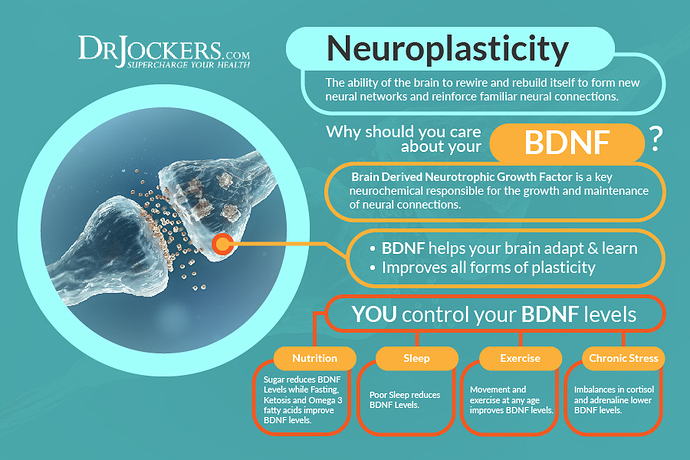BDNF is important for longterm memory and helps grow new neurons from neural stem cells (neurogenesis). R
Contents:
BASICS
Brain-Derived Neurotrophic Factor (BDNF) like NGF, CNTF, GDNF, CDNF, and MANF is a protein that promotes brain growth. R
It acts on the central nervous system and the peripheral nervous system:
•helps support the survival of existing (DRG) neurons R
•encourages the growth and differentiation of new neurons and synapses R
In the brain, it is active in the hippocampus, cortex, and basal forebrain (areas vital to learning, memory, and higher thinking). R
It is also expressed in the retina, motor neurons, the kidneys, saliva, and the prostate. R
Neurotrophins are proteins that help to stimulate and control neurogenesis, BDNF being one of the most active. R R R
BDNF is important for the development of the brain, sensory nervous system and neural development, as mice born without the ability to make BDNF, will usually die soon after birth. R
BDNF increases until around the age of 65, and then after decrease markedly. R
BDNF facilitates glutamate release that the presynapse to increases postsynaptic glutamate receptor synthesis. R
BDNF is levels can be different in different places: blood, cerebrospinal fluid (CSF), and various brain locations, but there is no correlation between blood BDNF and CSF BDNF. R
Blood BDNF may be reliable marker, since BDNF can cross the blood brain barrier. R R
BDNF has a circadian rhythm. R R
Research:
-
Brain changes in BDNF and S100B induced by ketogenic diets in Wistar rats.
-
THE NEUROPROTECTIVE PROPERTIES OF CALORIE RESTRICTION, THE KETOGENIC DIET, AND KETONE BODIES
-
BDNF Alzheimer’s – The Fundamental Principle - Dr. David Perlmutter, MD.
-
The efficacy of the ketogenic diet on motor functions in Parkinson’s disease: A rat model
-
Angiogenesis (treatment for Parkinson’s Disease?) - ZHITTYA REGENERATIVE MEDICINE INC. See also How I Reversed My Parkinson’s Disease Symptoms - John Gray and Ice Bucket Challenge? No. Ketogenic Diet for ALS? Yes!
-
New Evidence Suggests Parkinson’s Might Not Start in The Brain A new study adds further evidence to a growing number of research breakthroughs which suggests that Parkinson’s (PD) originates in the gut and not the brain. New research outcomes in mice suggest PD might actually start in the gut and this might explain why most Parkinson’s patients complain of constipation and gut-related symptoms before other symptoms arise. See also Read the background science paper - 'Microbiota-gut-brain signalling in Parkinson’s disease: Implications for non-motor symptoms- ~ Valeria D. Felice, Eamonn M. Quigley, Aideen M. Sullivan, Gerard W. O’Keeffe, Siobhain M. O’Mahony and Parkinson’s: Could this existing drug (for tapeworm) halt disease progression?
-
Oil Change: Can the Ketogenic Diet Treat Multiple Sclerosis? See also Can Low Carb, High Fat Ketogenic Diets Improve MS And Other Neurological Disease Symptoms? and The Therapeutic Potential of the Ketogenic Diet in Treating Progressive Multiple Sclerosis
-
Brain Tumor - A Diet for Brain Cancer The Ketogenic Diet: The Ketogenic Diet is a very high fat, high protein, and extremely low carbohydrate diet typically used to treat epilepsy (Porta N et al 2009). Without carbohydrates, the body shifts from using glucose to ketones for energy. … Brain tumor cells can only burn glucose. See also Can a keto diet treat brain cancer? and Treatment of glioma patients with ketogenic diets: report of two cases treated with an IRB-approved energy-restricted ketogenic diet protocol and review of the literature
-
Genetic and Epigenetic Regulation of the Brain-Derived Neurotrophic Factor in the Central Nervous System (note related: P53 apoptosis {and cancer cells} FOX04 and FOX DRI binding behavior, mechanism dynamics and senescent cell death)
-
Human rGDF-11 counteracts age-related short-term memory impairments in middle-aged mice


 As do the MCTs in GRASSFED butter, yoghurt, and kefir - though to a lesser degree.
As do the MCTs in GRASSFED butter, yoghurt, and kefir - though to a lesser degree.

